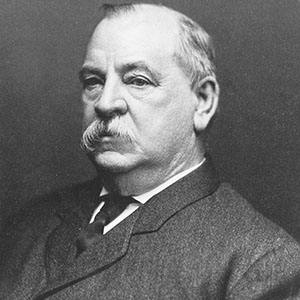Grover Cleveland served as the nation’s 22nd President from 1885-1889 and the 24th President from 1893-1897. Although Cleveland’s reputation as an active reformer led to him being regarded as the ideal presidential candidate, his legacy as president was tarnished by his inability to address one of the nation’s worst economic depressions.
Early Life
Grover Cleveland was born on March 18th, 1937 in Caldwell, New Jersey. After spending a portion of his life teaching in New York City, Cleveland decided to pursue law as a career where he operated his own firm for approximately seventeen years. Thereafter, Cleveland made the transition to politics, where he served as the mayor of Buffalo and governor of New York. As mayor and governor, Cleveland actively sought to eliminate corruption within the city and state. Cleveland’s dedication to this task helped him gain the approval of Democrats around the nation, who viewed him as the ideal candidate to become the nation’s president.
Cleveland’s Presidency
Grover Cleveland was heavily criticized for his failure to set and actively pursue political goals during his tenure as president. Cleveland believed that it was ideal for a president to have a more passive role as opposed to constantly pushing a political agenda. Cleveland practiced what he preached, as he rarely used his power to encourage Congress to achieve certain ends through legislation. Instead, Cleveland would work towards accomplishing his goals by vetoing bills he opposed. Cleveland did, however, take a very strong stance on the proper interpretation of the Tenure of Office Act of 1867 during his first term. Cleveland argued that under the act, the president had the power to remove federal officials without obtaining Congress’s consent. In arguing for this interpretation, Cleveland successfully fended off strong Republican opposition to his interpretations. Cleveland was also criticized for his approaches to resolving important social issues. For example, Cleveland was selective with who he believed should be treated as equals, as he would oppose those who retaliated against Chinse immigrants yet would side with Americans who opposed treating African Americans as equals.
Cleveland’s second term of presidency posed far greater challenges than his first. During his second term, the United States endured one of its greatest economic depressions where national unemployment reached nineteen percent. In response to the depression, Cleveland repealed the Sherman Silver Purchase Act of 1890. However, repealing the caused disastrous economic results which led to a bailout by J.P. Morgan. Moreover, in 1894 Cleveland used federal troops to end an Illinois labor strike, which led to numerous Americans feeling betrayed by Cleveland. These responses to the depression led to Americans questioning Cleveland’s leadership and the Democrats declining to nominate him as the Democratic candidate for the 1896 election.








